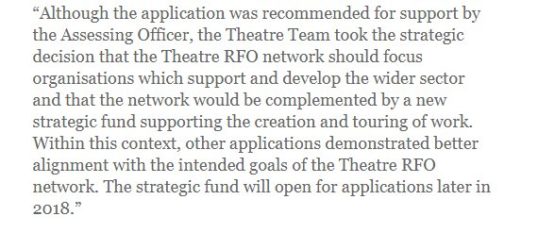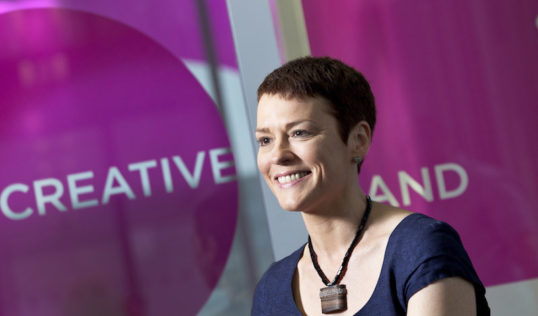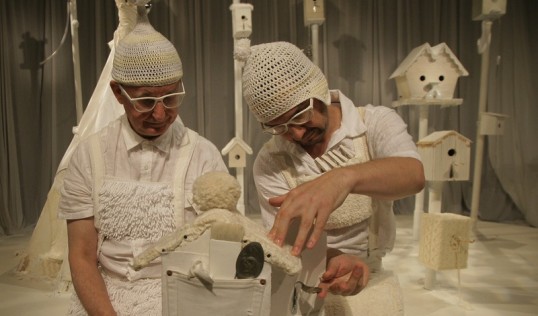Creative Scotland’s creativity fail
Communication breakdown as CS announces RFO network
Creative Scotland announced its latest round of fixed three-year funding on Thursday 25 Jan 2018 with what looks like the organisation’s best aimed – and least necessary – shot at its own feet ever.
And even in its short history, it has taken a few of those.
“Creative Scotland marks Year of Young People by cutting all three-year funding for children’s theatre” thundered the Holyrood Magazine, summing up the mood of the reaction most succinctly.
The funding round is for what Creative Scotland calls its Regularly Funded Organisations – distributing £33m a year to a network of 116 organisations. Funding which is guaranteed for the next three years.
Reaction across the theatre world has been vociferous and justified. While a large number of buildings and organisations have been funded, several touring theatre and dance companies have been ditched from RFO status and had their funding removed.
Not least amongst these are Catherine Wheels Theatre Company and Visible Fictions – the only two RFOs making work for children – a sector of which the theatre community is justifiably proud. Also gone are Birds of Paradise and Lung Ha’s, two companies making theatre by disabled people.
The removal of any of these four from RFO status seems at best misguided. But the removal of Catherine Wheels in particular is a mistake of seismic proportions within the world of theatre for children. This is not cutting a genre of theatre, this is cutting a whole sector of the theatre industry.
backbone
This RFO network provides the backbone of Creative Scotland’s funding. These are the organisations which, across the different art forms, will provide its key targets over the next three years.
Of that £33m, £7.63m has been allocated to theatre companies and organisations which have a remit solely for theatre – such as Grid Iron and the Lyceum. A further £10.14m goes to multi-artform organisations – mostly venues such as the Traverse which stage a variety of different artforms.
This is roughly the same amount it gave to those types of RFO three years ago. On the surface, the removing of 20 RFOs and the addition of a different 18 new ones appears as if Creative Scotland has just been shuffling the money around a bit and, oh dear, some people have had their funding cut and, hurrah!, some have got new funding.
The truth is it does have a plan – or half a plan – and one based on consultation with the Scottish theatre sector at that. The problem is that it has failed to communicate its plan.
failed to communicate
It failed to successfully communicate it to journalists writing about the funding decisions as it was announced because of the way in which it releases its information.
It failed to communicate it to those with which it did the consulting, resulting in a complete cock-up in the delivery of a plan.
And worst of all, it failed to communicate it with any sense of grace to those most effected by the changes.
Find out why it has failed on those three counts, and my guess is you would find out why Creative Scotland keeps on pointing the loaded gun at its feet and pulling the trigger.
But that is beside the point at the moment. The point is that the plan itself is based on consultation about touring theatre in Scotland. A paper on the matter was produced last April, and it talks clearly about the problems the theatre touring network – of shows turning up for “one night stands”, of shows playing to 15% capacity audiences, of shows being staged on tighter and tighter budgets running for shorter and shorter tours.
Of all the untapped audiences we need to reach, one CS insider told me, the one which we need to get to most is the one which is not buying seats in empty theatres. The audience which would pay £10, £15 for a ticket.
a new way of working
So, it is agreed by Creative Scotland, by the touring theatre companies and by the multi-artform buildings, that funding for touring theatre in Scotland needs to progress, to change and to find a new way of working.
In short, Creative Scotland needs to get creative about the future of touring theatre in Scotland, because if it doesn’t, there won’t be any.
This then, is Creative Scotland’s idea of getting creative about the future of touring. It is going to move all its companies making theatre for touring out of the RFO network and allow them to compete for a £2million fund, ring-fenced for touring, to which they can apply from late 2018.
Okay, it is a move, a change, a way forward and maybe it is a good plan, maybe it isn’t. But you do have to wonder that it has been brought into action just at the point where the Federation of Scottish Theatre, which ran the previous paper, is in the middle of more consultation about the matter but didn’t bother to consult the FST about what it is doing.
And you do have to hope that this £2m is going to be over and above the money (£1.7m in 2015/16) it already spends on touring theatre through other budgets. Particularly as it is for ALL artforms and not just theatre.
But if all that is fine, why has Creative Scotland not been championing that change to the theatre sector? Why has it not been trumpeting about the strength of the network it is setting up and the way that the new regime for touring theatre will make it better?
Why has it not gone to the people who it has been working with for several years on the issue of regional touring and persuaded them of the strength of its proposed model?
And why did it not discuss with the RFOs about their cuts, rather than sending them summary notes such as the one which it sent to Catherine Wheels?

Creative Scotland’s justification for dropping Catherine Wheels from RFO status, showing that it regards theatre for children as a genre within the theatre sector, not a sector in its own right.
All of these things would have demonstrated that the organisation as a whole cares about the people with whom it works.
The reason, I suspect, that it did not do these things is that it doesn’t actually know how that plan is going to work. And if it were to discuss it too much, then it would get so bogged down that it might never happen – and the sector agrees, change needs to happen.
But if it had talked to anyone, it would have heard that removing RFO status from Catherine Wheels does not fit with its plan. The company is of strategic and structural importance to the children’s theatre sector in Scotland – it doesn’t merely tour successfully, but it supports and develops the wider sector.
Catherine Wheels is a company which really does make touring work – just look at its website and look at the number of productions it has and the number performances they have had. All on tour. It is probably the biggest, and most successful touring company in Scotland.
true leadership
It toured 11 shows in 2017, probably all to capacity or near capacity audiences. It toured round Scotland and it toured internationally. And for those 11 shows it received a public subsidy of less than £20K a production.
Last Autumn, the Royal Court theatre in London cancelled a planned run of Rita, Sue and Bob Too in the wake of the #MeToo. The theatre’s artistic director, Vicky Featherstone, quickly realised it was a wrong decision and took the much tougher decision to reinstate it.
True leadership is not about getting it right all the time, but knowing when you are wrong and how to revisit a flawed situation.
Janet Archer, who is the chief executive of Creative Scotland, now needs to show real leadership of her organisation. It has made a wrong decision and she now has to be brave enough – and creative enough – to change that decision and reinstate Catherine Wheels.
Otherwise, she will be culpable of taking Creative Scotland’s loaded gun and blasting not at her own organisation’s feet, but straight in the face of the Children’s Theatre sector.
ENDS





















Comments (1)
Trackback URL | Comments RSS Feed
Sites That Link to this Post